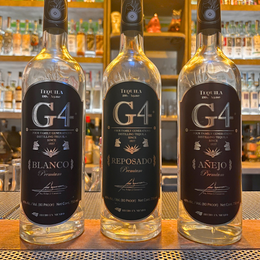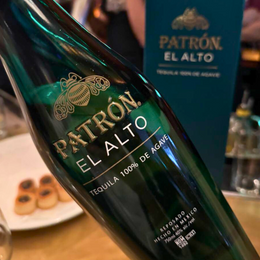The Cascahuin Story, Protector Of Tequila Traditions Since 1904; Taste Testing Cascahuin Reposado vs Anejo

In the rather quiet yet quaint town of El Arenal, lies a Tequila maker that has preserved traditional methods for over a century, and even today amidst the sea of commercial producers who've focused more on producing at scale, one Cascahuin has held on to the traditional practices that keep their Tequilas as they were historically.
Now El Arenal itself is considered locally to be an incredibly important and historic Tequila producing town, being one of the oldest agave growing areas in Tequila, and is colloquially known as the place to hit up if you want to find more traditional Tequila-makers, even as it sits not too far off from the much more bustling Guadalajara.


Here Cascahuin (or properly, Cascahuín) has resided since 1904 (under the NOM 1123), having been established by one Salvador Rosales Briseño, and named after the Cerro de Luz or Hill of Light, referring to an agave covered hill near the distillery (which is the hill featured on Cascahuin's label!). It's also said that that nearby hill was known to contain large deposits of ore, which would attract lightning during thunderstorms creating bright flashes, and hence another reason for the name. In the early years, the Rosales family was focused on collaborating with distributor David Suro (of Suro Imports) to produce the Siembra Valles brand of Tequila, and it wasn't until the 1950's that they began producing under their own Cascahuin name.

Chava and Don Salvador Rosales Torres.
Over the past five generations, Cascahuin has thus employed time honoured traditional practices of making its Tequila, trading scale for craftsmanship, which has thus distinguished the Tequila maker and made it a cult favourite amongst Tequila lovers. Today Cascahuin is operated by Don Salvador Rosales Torres and his sons Salvador ("Chava") and Benjamin, and have been aided by their brand ambassador Tetsu Shady, a Japanese mixologist who had previously worked in a specialist bar in Tokyo, but fell in love with Jalisco, and in particular had formed a great bond with Chava, and thus had joined Cascahuin ever since.
This all starts with the selection of the agave. Every batch of Cascahuin Tequila is made from the harvest of a single estate, some from the Rosales family's own fields, whilst others sourced from carefully selected growers around the Valles region of Jalisco, many of whom the family has worked closely with over several generations. Once at the distillery, the pina is chopped into small pieces and made sure to remove the core for male agaves, as well as any parts that might give rise to bitterness. The pinas are then packed into traditional hornos brick ovens (as opposed to industrial scale autoclaves) where it is cooked for 8 hours per day for three days, before being left to rest for a full day and then taken out - a significantly longer period than commercial standards. This slow cooking allows the pinas to breath in between being cooked, to allow for the sweet juices to drain out. After the four day process, the pinas are then collected, chopped down, and then squeezed and rinsed with local well water to yield all the juices. The family has even preserved an ancient pit oven which was once used to cook the agaves by covering them in ash over a woodfire!

The Rosales family believes that this no shortcuts approach is able to guarantee better quality and more robust flavours, even if it results in lower yields produced. As such, they've even brought back the use of other traditional practices such as a tahona (massive volcanic rock wheel used to crush the cooked pinas) - this is used for the special edition Tahona-milled Blanco. In most instances, a roller mill is used to squeeze out any remaining juices from the cooked agave. Fermentation is done in an open vat both with and without fibers, and after which it is thus double distilled using a pot still. For the special edition Tequila Ancestral, a special earthen oven and wood-copper pot still is used instead as per ancient customs.
What results is a clear 70% ABV agave spirit, which is then reduced to various proofs ranging from 38% to 40%, with also a higher proof 48% ABV. The Reposado and Anejo Tequilas are then aged in ex-Bourbon (Jack Daniel's) barrels for varying lengths of time.
And thus Cascahuin has made itself the go-to Tequila house for those seeking more artisanal and traditional Tequilas, with quite a wide range of expressions to explore, from its flagship traditionally made Tequilas, to limited editions that weave in even more ancient practices, as well as several lines of aged Tequilas.
Today we'll be trying Cascahuin's Reposado and Anejo Tequilas!
PS. Big shoutout to Singapore's Cat Bite Club for bringing these in! If you're a Tequila/Mezcal/Sotol lover or even just someone who is curious about them - there is one place for it all, and that's Cat Bite Club! And if the drinks are good, the folks behind the bar are even greater! Say hi to Jesse, Gabe and Erika for us!
Tequila Review: Cascahuin Reposado, 38% ABV

Tasting Notes
Colour: Light Gold
Aroma: Roasted vegetables on the nose at first - roasted aubergines, zucchini and collard greens. Beyond the mild roasty aromas, there is a fruity, sweeter and fleshy aroma of sliced tart crisp baking apples and underripe green pear. Letting it sit for a bit, more vegetal aromas arise, like stir-fried Chinese olives and oven roasted kale, with a lingering background note of light caramel.
Taste: Quite sweet initially - tasting of crushed apple juice, raw baby maize and raw bell peppers, with a slight light caramel char developing on the palate afterwards. On subsequent tastings, more vegetal flavours arise, like raw spinach, rocket and salad leaves. The sweetness on subsequent tastings are more akin to lightly brown sugar, with a slight sarsaparilla aroma lingering after.
Finish: Slightly roasty and nutty, like peanuts and walnuts heated over a hot pan, which gives way to a fruity sweetness of sliced red apple and ripened pear. Longer into the finish, a slight horseradish heat and mustard green prickliness on the palate arise, tapering off afterward to leave behind a vegetal finish.

My Thoughts
This tequila, start to end, reads quite vegetal - whilst maintaining a slight sweetness that brings about some roundness and ease to the drinking experience. On the first sip, there is quite a big burst of sweetness that envelops the palate, which faded off quite quickly and give way to the more vegetal-dominant note. This tequila is relatively easy drinking, and I do like that vegetal quality this tequila has, whilst not going too hard on the smoke. After a prolonged time, the tequila has a mesquite, smoked oak wood aroma lingering in the glass.
Tequila Review: Cascahuin Anejo, 38% ABV

Tasting Notes
Colour: Dark Gold
Aroma: Hot coals, smoked apple wood and wood ash aromas arise at first, with smoked water, charred potato skins and rooty vegetables following after. Letting the tequila sit for a while, sweeter, more caramel notes arise, like burnt sugar and caramel sauce. There is a mild vegetal note intermingling with the smokier, woodier aromas, like charred kale, and zucchini. Upon sitting for a while, the tequila becomes very confectionery, reminiscent of oven baked cookies, cinnamon sugar flavoured cereal and toasted brioche.
Taste: Mildly sweet and roasty, reminiscent of roasted sweet potatoes, roasted waxy potatoes and deeply roasted onions. Amongst the roasted vegetal flavours are pops of sweetness, like muscovado sugar, creme brulee glaze and oven baked pomme fruits. Subsequently, the sweetness of the tequila takes the form of cooked vegetables, such as stir-fried carrots, cabbage and capsicums.
Finish: The finish is subtle, with more confectionery sweet flavours of ice cream soda, sarsaparilla flavoured drinks and roasted marshmallow. After the initial wave of sweetness, the tequila reverts back to cooked vegetables, like oven roasted kale chips, baked zucchini and stir-fried Chinese greens. On the background, there are pops of spice, such as ground cassia, cloves and grated nutmeg.

My Thoughts
I love that woody, smoky aroma on the nose! Imagine smoked wood chips and hot coals, all captured in a glass (best perceived within a glencairn or a spirit nosing glass of course). Compared to the Reposado, the Anejo is smoother, sweeter and more integrated, without a singular note dominating too much. On that note, this tequila leans more confectionery and sweet, persisting throughout the tasting. Compared to the nosing, the spirit is relatively straightforward, reading generally of cooked and baked sweetness with some accents of vegetal notes. In my opinion , the Anejo is easier to approach as a spirit for those starting out.

@vernoncelli






